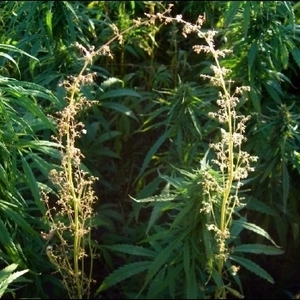New joint ventures aim to establish hemp-ethanol pilot plant




Vote Hemp
May 7, 2014
BY Holly Jessen
Edmonton, Alberta-based Syngar Technologies Inc. has announced two separate joint venture projects that will, together, help make hemp-to-cellulosic ethanol a step closer to reality.
Syngar Technologies, which was featured in a March 2012, article in Ethanol Producer Magazine has licensed its Pulsed Low Ultra Sound Wave (PLUSWave) Technology, which uses ultrasound frequencies to stimulate the fermentation growth of algae, bacteria, fungus or yeast microorganisms, including for use in production of ethanol. In late April the company formed Cellunol Inc. with ANW Inc., a South African company with a cellulosic pretreatment technology called Oxy-Hydro Fragmentation, said Garth Likes, CEO and chairman of Syngar Technologies. The second joint venture, announced in early May, is with Discovery Minerals LTD. and will involve pilot-scale testing of on-farm small-scale production of cellulosic ethanol using waste hemp materials as a feedstock. “It turns out that hemp is a pretty good alternative the cellulose content, as well as the fibers that are used to make clothing or whatever else,” he said.
Advertisement
Advertisement
ANW Inc. and Discovery Minerals LTD. will contribute funding to establish a pilot plant where the pretreatment and PLUSWave technology will be used to convert hemp and other cellulosic materials to cellulosic ethanol. The joint venture with Discovery Minerals will explore the concept of hemp farmers marketing hemp fibers from the hemp stalk, which can be used to produce clothing and other products, and using other, waste portions of the plant to produce on-farm cellulosic ethanol to offset the cost of hemp production, he said. How much ethanol can be produced on farm is unknown at this time and will depend on what parts of the hemp plant are used. (A variety of products can also be produced from hemp seed, according to Vote Hemp.) “For the hemp producers in Canada it’s to prove and demonstrate that the process is viable,” he said.
Currently, hemp farming is legal in Canada, where Syngar Technologies is located. However, a legal battle is being waged in the U.S. over hemp production, on the state and federal level. The hope is that the timing will work out that as the two joint ventures prove the viability of the process that, at least for on-farm ethanol production by hemp farmers, it will be “just about the right place at the right time,” he said.
Advertisement
Advertisement
Related Stories
The U.S. Department of Energy Bioenergy Technologies Office (BETO) announced up to $23 million in funding to support research and development (R&D) of domestic chemicals and fuels from biomass and waste resources.
The U.S. DOE has announced its intent to issue funding to support high-impact research and development (R&D) projects in two priority areas: sustainable propane and renewable chemicals and algal system cultivation and preprocessing.
Sens. Sherrod Brown, D-Ohio, and Pete Ricketts, R-Neb., in August introduced the Renewable Chemicals Act, a bill that aims to create a tax credit to support the production of biobased chemicals.
The Chemical Catalysis for Bioenergy Consortium, a consortium of the U.S. DOE’s Bioenergy Technologies Office, has launched an effort that aims to gather community input on the development of new biomass processing facilities.
USDA on March 8 celebrated the second annual National Biobased Products Day, a celebration to raise public awareness of biobased products, their benefits and their contributions to the U.S. economy and rural communities.
Upcoming Events










